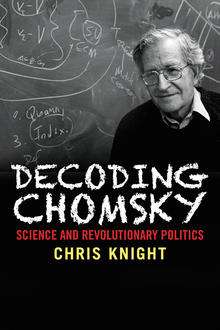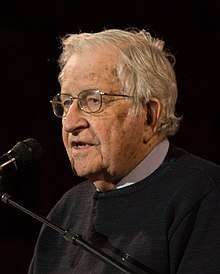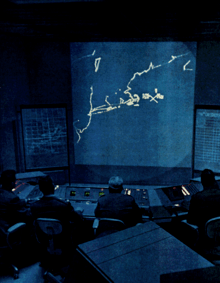Decoding Chomsky
 Cover | |
| Author | Chris Knight |
|---|---|
| Country | United States |
| Language | English |
| Subject | Noam Chomsky |
| Publisher | Yale University Press |
Publication date | 2016 (hardback); 2018 (paperback) |
| Media type | Print (Hardcover and Paperback) |
| Pages | 304 |
| ISBN | 978-0300221466 |

Decoding Chomsky: Science and revolutionary politics is a 2016 book by the left-wing activist and linguistic anthropologist Chris Knight on Noam Chomsky's approach to science and politics. Knight admires Chomsky's politics, but argues that his linguistic theories were influenced in damaging ways by his immersion since the early 1950s in an intellectual culture heavily dominated by US military priorities, an immersion deepened when he secured employment in a Pentagon-funded electronics laboratory in the Massachusetts Institute of Technology.[1]
In October 2016, Chomsky dismissed the book, telling The New York Times that it was based on a false assumption since, in fact, no military "work was being done on campus" during his time at MIT.[2] In a subsequent public comment, Chomsky on similar grounds denounced Knight's entire narrative as a "wreck ... complete nonsense throughout".[3] In contrast, a reviewer for the US Chronicle of Higher Education described Knight's book as perhaps "the most in-depth meditation on 'the Chomsky problem' ever published".[4] In the UK, the New Scientist described Knight's account as "trenchant and compelling".[5] The controversy continued in the London Review of Books, where the sociologist of science Hilary Rose cited Knight's book approvingly, provoking Chomsky to denounce what he called "Knight's astonishing performance" in two subsequent letters.[6] The debate has continued in the pages of Open Democracy.
Since the book was published, Knight has published evidence that Chomsky worked on a military sponsored "command and control" project for the MITRE Corporation in the early 1960s.[7]
The argument

Knight's book begins with Chomsky's claim that his political and scientific outputs have little connection with each other. For example, asked in 2006 whether his science and his politics are related, Chomsky replied that the connection is "almost non-existent ... There is a kind of loose, abstract connection in the background. But if you look for practical connections, they're non-existent."[8]
Knight accepts that scientific research and political involvement are distinct kinds of activity serving very different purposes. But he claims that, in Chomsky's case, the conflicts intrinsic to his institutional situation forced him to drive an unusually deep and damaging wedge between his politics and his science.
Knight points out that Chomsky began his career working in an electronics laboratory whose primary technological mission he detested on moral and political grounds. Funded by the Pentagon, the Research Laboratory of Electronics at MIT was involved in contributing to the basic research required for hi-tech weapons systems.[9] Suggesting that he was well aware of MIT's role at the time, Chomsky himself recalls:
"There was extensive [military] research on the MIT campus. ... In fact, a good deal of the [nuclear] missile guidance technology was developed right on the MIT campus and in laboratories run by the university."[10]
It was because of his anti-militarist conscience, Knight argues, that such research priorities were experienced by him as deeply troubling. By way of evidence, Knight cites this correspondence from The New York Review of Books in 1967:
George Steiner: "Will Noam Chomsky announce that he will stop teaching at MIT or anywhere in this country so long as torture and napalm go on? ... Will he even resign from a university very largely implicated in the kind of 'strategic studies' he so rightly scorns?"
Noam Chomsky: "I have given a good bit of thought to the specific suggestions that you put forth... leaving the country or resigning from MIT, which is, more than any other university, associated with activities of the department of 'defense.' ... As to MIT, I think that its involvement in the war effort is tragic and indefensible."[11]
Chomsky's situation at MIT, according to Knight, is summed up by Chomsky when he describes some of his colleagues this way:
"It is appalling that a person can come through an MIT education and say the kinds of things that were quoted in the New York Times article on Sunday, November 9 [1969]... One student said, right along straight Nazi scientist lines: What I'm designing may one day be used to kill millions of people. I don't care. That's not my responsibility. I'm given an interesting technological problem and I get enjoyment out of solving it. You know perfectly well that we can name twenty faculty members who've said the same thing. ... This is an attitude that is very widely held and very widely expressed."[12]
Chomsky, then, apparently felt that a number of his colleagues were no better than Nazi scientists. In order to maintain his moral and political integrity, Knight argues, Chomsky resolved to limit his cooperation to pure linguistic theory of such an abstract kind that it could not conceivably have any military use.
With this aim in mind, Chomsky's theoretical modelling became so abstract that not even language's practical function in social communication could be acknowledged or explored. One damaging consequence, according to Knight, was that scientific investigation of the ways in which real human beings use language became divorced from what quickly became the prevailing MIT school of formal linguistic theory.
Knight argues that the conflicting pressures Chomsky experienced had the effect of splitting his intellectual output in two, prompting him to ensure that any work he conducted for the military was purely theoretical—of no practical use to anyone—while his activism, being directed relentlessly against the military, was preserved free of any obvious connection with his science.
To an unprecedented extent, according to Knight, mind in this way became divorced from body, thought from action, and knowledge from its practical applications, these disconnects characterizing a philosophical paradigm which came to dominate much of intellectual life for half a century across the Western world.
Reception
Knight's book has been both criticised and acclaimed by wide variety of commentators.
Negative
- Norbert Hornstein and Nathan Robinson dismiss the book as an example of Marxist-inspired cultural relativism, written by someone who is determined to salvage Marxist dogma by deliberately misrepresenting Chomsky's real views. They question the motives of Yale University Press, asking why Yale considered it appropriate to publish Knight's openly Marxist critique. Their explanation is that this elite publisher is part of the US corporate establishment dedicated to ruling the population through "the manufacture of consent" and constructing "a world in which authors can tell any number of lies they like". (Current Affairs).[13]
- Robert Barsky argues that since Knight was never formally trained in Chomsky's conception of theoretical linguistics, he has no right to comment on whether it stands up as science. Decoding Chomsky, claims Barsky, offers no original insights, consisting only of "a weak rehash of critiques from naysayers to Chomsky's approach". While Barsky concedes that Chomsky did work in a military laboratory, he argues that this cannot be significant since virtually all US scientists receive Pentagon funding one way or another. (Moment).[14]
- Peter Stone claims that Knight hates Chomsky and "for that reason, he wrote Decoding Chomsky – a nasty, mean-spirited, vitriolic, ideologically-driven hatchet job". Stone states that, although Knight is on the Left, "the level of venom on display here exceeds that of all but the most unhinged of Chomsky’s detractors on the Right." He goes to state that "Knight spares no opportunity to paint Chomsky’s every thought and deed in the blackest possible terms" and that: "Decoding Chomsky is not a critique of a body of work in linguistics; it is an attempt to demonise a man for his perceived political deviations, even though that man happens to be on the same side of the political spectrum as the man who is demonising him. Reading Decoding Chomsky taught me something about the mindset of the prosecutors in the Moscow Show Trials."[15]
- Wolfgang Sperlich targets Knight's explanation for the so-called "Chomsky problem", the supposedly striking disconnect between Chomsky the activist (working against the military) and Chomsky the scientist (working in a military lab). According to Sperlich, Knight insinuates that Chomsky was willing "to sell his soul for a fat salary package". Sperlich responds: "What does Chris Knight want from him? That he dress in rags and live in a hovel?" Sperlich claims that at no point did Chomsky collude with any of the Pentagon's plans to make use of his research. (Wolfgang Sperlich's blog).[16]
Positive
- Michael Tomasello (author of A Natural History of Human Thinking): "Knight has dug deeper and made more interconnections than anyone has done before. The result is truly revelatory."[17]
- Marek Kohn (author of As We Know It: Coming to Terms with an Evolved Mind): "Chris Knight tells a compelling story with startling clarity and forceful elegance."[17]
- Daniel Everett (author of How Language Began): "Knight's exploration is unparalleled. No other study has provided such a full understanding of Chomsky's background, intellectual foibles, objectives, inconsistencies, and genius."[18]
- Frederick Newmeyer (author of Linguistic Theory in America): "The best critique of Chomsky from the left that I have ever read".[17]
- Houman Barekat: "Chris Knight is to be commended for this engaging and thought-provoking intellectual history of a thesis that remains hotly contested." Times Literary Supplement, October 2017.[19]
- Sarah Blaffer Hrdy (author of Mothers and Others: The evolutionary origins of mutual understanding): "Just how we came by language remains hotly contested. In Decoding Chomsky, Chris Knight strides into this minefield to bravely replace miraculous leaps and teleology with a proposal that actually makes evolutionary sense."[20]
- Sean O'Neill: "History comes alive via compelling narrative . . . Knight is indeed an impressive historian." American Ethnologist, August 2017[21]
- Nick Enfield (author of How We Talk): "Fascinating on so many levels, Knight's critique of an academic demigod is a compelling case study.[20]
- David Golumbia (author of The Cultural Logic of Computation): "This is one of the most exciting scholarly books I have read in years. Decoding Chomsky will be required reading for anyone at all interested in the history of intellectual and political thought."[17]
- Luc Steels (director of the AI Laboratory, Free University, Brussels): "A truly fantastic work, simply brilliant. I could not put it down."[17]
- David Hawkes (author of Ideology): "Simply brilliant. The first theoretically sophisticated analysis of a chasm between mind and body, theory and practice which has become profoundly symptomatic of postmodern culture as a whole."[17]
- Les Levidow (editor of Science as Culture): "This book provides a fascinating account of the disconnect and symmetry between Chomsky's value-free science and his science-free politics."[20]
- Gary Lupyan (University of Wisconsin): "A must-read for anyone trying to understand the history and trajectory of Chomsky's ideas."[20]
- Bob Feldman (SDS Steering Committee, Columbia University 1968): "Intellectually hip and iconoclastic, ... Knight's chapter on MIT's historical relationship to the Pentagon [is] especially cutting-edge, ground-breaking and informative."[20]
- Thomas Klikauer "[Decoding Chomsky] is an insightful book and, one might say, a-pleasure-to-read kind of book." The European Legacy, March 2018[20]
- Michael Johnson "Decoding Chomsky is ... so lucid and well-researched and intellectually and emotionally gripping I couldn't find a fault with it, though I tried." Overweening Generalist [22]
- Peter Seyferth "Decoding Chomsky ... is absolutely devastating." Anarchist Studies, Autumn 2017.[23]
Further research on Chomsky at MIT

In his book, Knight points out that the US military initially funded Chomsky's linguistics because they were interested in machine translation. Later their focus shifted and Knight cites Air Force Colonel Edmund Gaines’ statement that: "We sponsored linguistic research in order to learn how to build command and control systems that could understand English queries directly."[24]
In his book review, Robert Barsky poses the crucial question not answered in Knight's book: "Machine Translation research is turned into a project dedicated to 'command and control systems'. Really? And how did Chomsky contribute to that MT project?"
Since finishing Decoding Chomsky, Knight has found apparently compelling evidence shedding light on this question. It appears that between 1963 and 1965, Chomsky worked as a "consultant" on an Air Force project to establish English as an "operational language for command and control". This is confirmed by several of Chomsky's students at the time, who also worked on this military project.
According to one of these former students, Barbara Partee, the Air Force's justification for sponsoring Chomsky's approach to linguistics was "that in the event of a nuclear war, the generals would be underground with some computers trying to manage things, and that it would probably be easier to teach computers to understand English than to teach the generals to program."[25]
References
- ↑ Letters, London Review of Books, July 13, 2017
- ↑ Noam Chomsky and the Bicycle Theory. Sam Tanenhaus interviews Noam Chomsky. The New York Times, October 31, 2016
- ↑ Sam Fenn interviews Chris Knight and Noam Chomsky responds. Chomsky's Carburetor. Cited Podcast. http://citedpodcast.com/23-chomskys-carburetor/
- ↑ The Chomsky Puzzle. Piecing together a celebrity scientist, by Tom Bartlett. Chronicle of Higher Education, August 25, 2016.
- ↑ New Scientist, November 2, 2016
- ↑ Letters, London Review of Books, June 1; June 15; July 13, 2017
- ↑ "When the Pentagon Looked to Chomsky's Linguistics for their Weapons Systems", 3 Quarks Daily, 12 March 2018.
- ↑ Decoding Chomsky, p. 248, n. 20, citing Irish Times, January 21, 2006.
- ↑ Decoding Chomsky, p. xi, citing 'Tri-Services Honor MIT Achievements in Military Electronics R&D', Army Research and Development News Magazine, Vol. 12 no.4, July-August 1971, p 68.
- ↑ Decoding Chomsky, p. xiv, citing Chomsky, N. (2004). Language and Politics (Second ed.). Edinburgh: AK Press. p. 216. ISBN 1-902593-82-0.
- ↑ Abbreviated in Decoding Chomsky, p. 37; citing full text in The New York Review of Books, March 23, 1967
- ↑ Abbreviated in Decoding Chomsky, p. xviii, citing full text in Chomsky, N. 2002. On Democracy and Education. Edited by C. P. Otero, p. 290.
- ↑ "1000 Ways To Misrepresent Noam Chomsky". Current Affairs.
- ↑ "Book Review // Decoding Chomsky". Moment Magazine. September 2016.
- ↑ "Book Review // Decoding Chomsky". Philosophy Now. September 2018.
- ↑ "A review of Decoding Chomsky (2016) by Chris Knight". wolfgangsperlich.blogspot.co.uk.
- 1 2 3 4 5 6 Knight, Chris (September 2, 2016). Decoding Chomsky: Science and Revolutionary Politics. Yale University Press. ASIN 0300221460 – via Amazon.
- ↑ D. L. Everett, Review of Chris Knight's 'Decoding Chomsky: Science and revolutionary politics. Language and Cognition, September 2017, Cambridge University Press. DOI: 10.1017/langcog.2017.15
- ↑ "Review of Decoding Chomsky in the Times Literary Supplement".
- 1 2 3 4 5 6 "20+ reviews of Decoding Chomsky".
- ↑ "Review of Decoding Chomsky: Science and Revolutionary Politics". American Ethnologist. 4 (3): 541–542.
- ↑ http://overweeninggeneralist.blogspot.co.uk/2016/09/chomsky-decoded-by-chris-knight.html
- ↑ http://scienceandrevolution.org/blog/2018/3/17/anarchist-studies-review-of-decoding-chomsky
- ↑ Decoding Chomsky, pp. 53–72 and 16, citing Frederick Newmeyer, The Politics of Linguistics, Chicago 1986, pp. 85–6.
- ↑ C. Knight, "When the Pentagon Looked to Chomsky's Linguistics for their Weapons Systems", 3 Quarks Daily, March 12, 2018 (citing Arnold Zwicky, "Grammars of Number Theory: Some Examples", Working Paper W-6671, MITRE Corp., 1963, Foreword, last page). In 1971, a former Air Force Colonel, Anthony Debons, wrote: "much of the research conducted at MIT by Chomsky and his colleagues [has] direct application to the efforts undertaken by military scientists to develop ... languages for computer operations in military command and control systems." A. Debons, "Command and Control: Technology and Social Impact", in F. Alt and M. Rubinoff, Advances in Computers, Vol.11, 1971. New York/London 1971, p354.
External links
- Science and Revolution – Chris Knight's website on his Chomsky research.
.
- "Chomsky's choice: how the linguist's early military work led to a life of campaigning against the military" – Chris Knight.
- "Chomsky's linguistics and military funding: a non-issue" – Frederick Newmeyer.
- "Why Chomsky 'felt guilty most of the time'" – Chris Knight
- "The history of science: unreliable narrators and how science moves on" — Randy Allen Harris
- "Explaining Chomsky’s strange science: a reply to Randy Allen Harris" – Chris Knight
- "The Chomskyan revolution and the politics of linguistics" — David Golumbia
- "The Chomsky paradox: the responsibility of intellectuals, revisited" — Les Levidow
.
- "When Chomsky Worked on Weapons Systems for the Pentagon" – Chris Knight.
- "Chomsky: Between the war scientists and the anti-war students" – Chris Knight.
- Ready Steady Book interviews Chris Knight.
.
- Les Levidow speaks on Decoding Chomsky during student occupation of the Anthropology Department, University College London.
- Chris Knight speaks on Decoding Chomsky during student occupation of the Anthropology Department, University College London.
- Special conference at University College London, 2017, "The Responsibility of Intellectuals 50 years on", Chomsky, Knight and others speak at conference. Part 1 and Part 2.
- Chris Knight speaks on 'Decoding Chomsky' at the School of Oriental and African Studies.
- Zero Books Podcast interview: "Chomsky's Response": March 2018.
- Zero Books Podcast interview with Chris Knight on Decoding Chomsky: August 2016.
- Chomsky's Carburetor, Cited Podcast interview with Chris Knight, September 2016.
- The Chomsky Puzzle. Piecing together a celebrity scientist. Review by Tom Bartlett in The Chronicle of Higher Education, August 25, 2016.
.